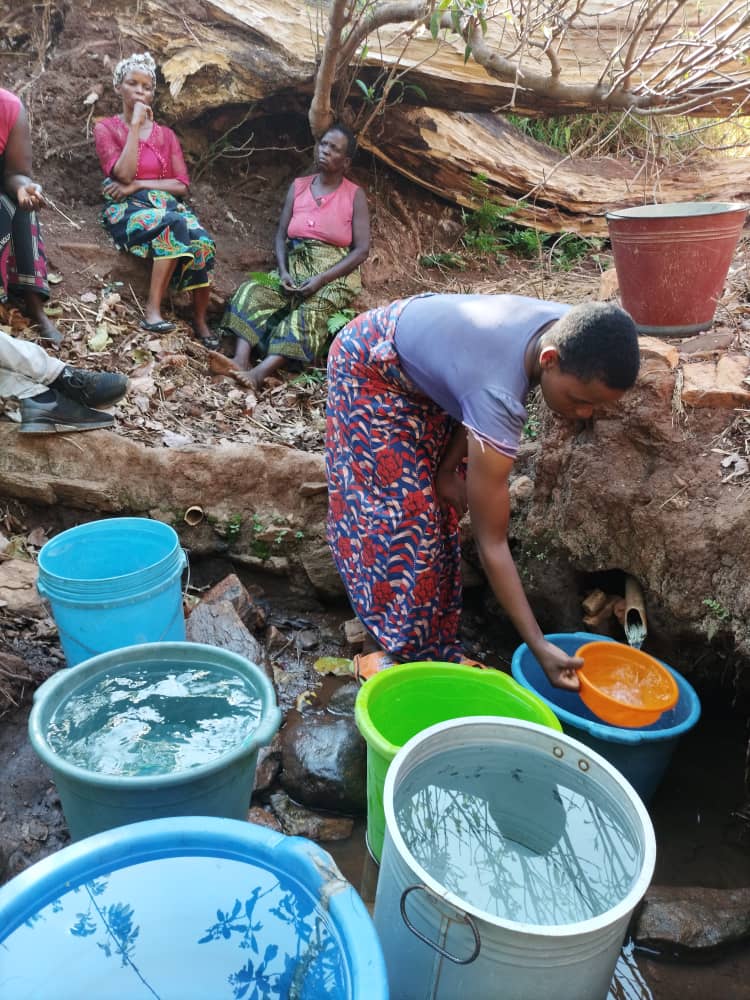Seven villages under Senior Group Village Head (SGVH) Kandodo II and his subjects in Traditional Authority (T/A) Kasakula in Ntchisi will, for the first time in the history of creation, drink from safe source, thanks to WaterAid Malawi.
The organization has committed to drilling the first ever borehole in Kandodo II Village to alleviate the challenges communities in this area face to access water, sanitation and hygiene (WASH) services.
Speaking to journalists who visited the area with support from WaterAid Malawi on Tuesday, SGVH Kandodo II said it is sad that his subjects are still drinking from unsafe sources 60 years after Malawi gained independence from the colonial masters.

“For decades, our politicians have used our WASH problems as a tool for campaign. Presidential candidates, aspiring members of Parliament and councilors for Ntchisi East Constituency have come and gone without delivering on their promises to drill boreholes in this area,” he said.
SGVH Kandodo II was wary that as the countdown to the 2025 General Elections continues, the serving and aspiring members of Parliament for the area will do similar mistakes of “promising to deal with our water problems” without fulfilling.
However, the chief has expressed excitement with the commitment from WaterAid Malawi to drill a borehole in his area before the end of this month.
He said the borehole will play a critical role in improving WASH services in the area.
WaterAid Malawi Programme Officer Laston Zungu said the organization has set aside MK500 million for drilling boreholes in communities surrounding three healthcare facilities in T/As Kasakula, Malenga and Chilooko in Ntchisi district.
Zungu said the initiative is aimed at easing congestion at boreholes drilled in healthcare facilities.
“We had noted that the communities were also flocking to the boreholes we drilled in healthcare facilities, leading to congestion. So in order to ease the congestion, we decided to drill boreholes in 10 villages that surround healthcare facilities where we are implementing our interventions,” he explained.
Zungu stated that procurement processes are at an advanced stage and they expect the contractor to start the work before end of November this year.
“We expect each borehole to cost us around MK12 million,” he narrated.
The United Nations General Assembly (UNGA) recognized access to clean drinking water and sanitation as a human right in 2010. In the same year, the Human Rights Council adopted the resolution, affirming that this right is essential to life and other human rights.
UN further states that everyone has the right to a water and sanitation service that is physically accessible within, or in the immediate vicinity of the household, educational institution, workplace or health facility.
Despite the Government of Malawi committing itself to the attainment of the UN Sustainable Development Goals (SDGs) and the African Union’s Agenda 2063 on access to water and sanitation, the situation on the ground tells a different story.
The dire need for access to clean and safe drinking water and sanitation services in Kondodo II and other villages across the country speaks volumes of how the government has run off-track to meet its objective of ensuring the availability and sustainable management of water and sanitation for all.
The latest Afrobarometer surveys in 39 African countries, including Malawi, found little progress toward the goal of universal access to safe water and sanitation.
The surveys found that water supply ranks fourth among the most important problems that Africans want their government to address.
“About one in four citizens report that their household frequently went without enough clean water during the past year. Only minorities enjoy access to piped water and a sanitation system, with stark disadvantages among rural and poor populations. A growing majority give their government poor marks on their provision of water and sanitation services,” reads the report in part.
Meanwhile, WaterAid Malawi Head of Policy and Advocacy, Chandiwira Chisi, has described WASH sector as playing a crucial role in fostering sustainable socio-economic development within our country.
Chisi stated that communities without access to safe and clean drinking water are at risk of waterborne disease such as cholera, typhoid fever, and diarrheal illnesses, which disproportionately affect children and the most vulnerable members of society such as the elderly.
“Disruptions in the water resources equilibrium have far-reaching impacts on all sectors, including energy, fisheries, forestry, agriculture, transport, industry, health, and households, among others. Robust policy frameworks and effective strategies are therefore essential to guide water development, allocation, utilization, and conservation within the WASH sector,” he said.